传感器(sensor)英文PPT演讲课件
传感器(sensor)英文PPT演讲课件
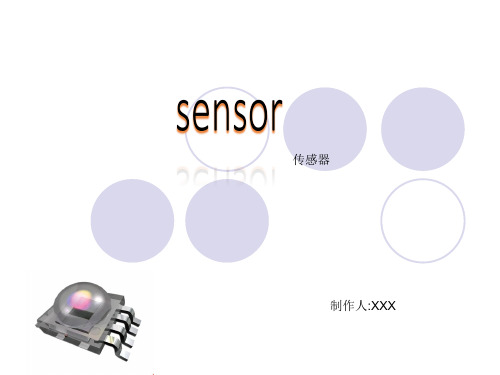
Aplication
A. the sensor does not need to check it agision. General Hall current sensor module’s precision in the work area is higher than 1%, and the precis ion is suitable for any waveform meas urement;
翻译
定义: 能感受规定的被测量并按照一定的 规律转换成可 用输出信号的器件或装置。 作用:
探测、感受外界的信号、物理条件(如光、 热、 湿度)或化学组成(如烟雾),并将 探知的信息传递给 其他装置或器官。
Light sensor
Light sensor is the most current production, one of the most widely used sensors, it plays
Working principle
Light sensors can converts light signals into electrical signals with photosensitive element sensor , its sensitive wavelengths is close to the visible light wavelength, including infrared wavelengthand ultraviolet wavelengths. Light sensor is not limited to light detection, it also can be used as a detection device of other sensors to test many non-electrical, as long as the nonelectric can be converted into optical signal changes.
传感器中英文介绍

传感器中英文介绍(总5页) -CAL-FENGHAI.-(YICAI)-Company One1-CAL-本页仅作为文档封面,使用请直接删除. sensorssensors(English name: transducer/sensor) is a kind of detection device, can feel the measured information, and will feel information transformation according to certain rule become electrical signal output, or other form of information needed to satisfy theinformation transmission, processing, storage, display, record and control requirements.Sensor's features include: miniaturization, digital, intelligent, multi-functional, systematic and network. It is the first step of automatic detection and automatic control. The existence and development of the sensor, let objects have sensory, such as touch, taste and smell let objects become live up slowly. Usually accordingto its basic cognitive functions are divided into temperature sensor, light sensor, gas sensor, force sensor, magnetic sensor, moisture sensor, acoustic sensor, radiation sensitive element, color sensorand sensor etc. 10 major categories.temperature transducerTemperature sensors (temperature transducer) refers to can feel temperature translates into usable output signal of the sensor. The temperature sensor is the core part of the temperature measuring instrument, wide variety. According to measuring methods could be divided into two types: contact and non-contact, according to the sensor material and electronic component features divided into two categories, thermal resistance and thermocouple.1 principle of thermocoupleThermocouple is composed of two different materials of metal wire, the welded together at the end. To measure the heating part of the environment temperature, can accurately know the temperature of the hot spots. Because it must have two different material of the conductor, so called the thermocouple. Different material to make the thermocouple used in different temperature range, their sensitivityis also each are not identical. The sensitivity of thermocouplerefers to add 1 ℃ hot spot temperature changes, the output variation of potential difference. For most of the metal material supportther mocouple, this value about between 5 ~ 40 microvolt / ℃.As a result of the thermocouple temperature sensor sensitivityhas nothing to do with the thickness of material, use very fine material also can make the temperature sensor. Also due to the production of thermocouple metal materials have good ductility, the slight temperature measuring element has high response speed, can measure the process of rapid change.Its advantages are:(1)high precision measurement. Because of thermocouple direct contact with the object being measured, not affected by intermediate medium.(2)the measurement range. Commonly used thermocouple from1600 ℃ to 50 ℃ ~ + sustainable measurement, some special thermocouple minimum measurable to - 269 ℃ (e.g., gold iron nickel chrome), the h ighest measurable to + 2800 ℃ (such as tungsten rhenium).(3) simple structure, easy to use. Thermocouple is usually composed of two different kinds of metal wire, but is not limited by the size and the beginning of, outside has protective casing, so very convenient to use. The thermocouple type and structure of the form.2. The thermocouple type and structure formation(1)the types of thermocoupleThe commonly used thermocouple could be divided into two types: standard thermocouple and non-standard thermocouple. Standard thermocouple refers to the national standard specifies its thermoelectric potential and the relationship between temperature, permissible error, and a unified standard score table of thermocouple, it has with matching display instrument to choose from. Rather than a standard thermocouple or on the order of magnitude less than therange to use standardized thermocouple, in general, there is no uniform standard, it is mainly used for measurement of some special occasions.Standardized thermocouple is our country from January 1, 1988, thermocouple and thermal resistance of all production according toIEC international standard, and specify the S, B, E, K, R, J, T sevenstandardization thermocouple type thermocouple for our countryunified design.(2)to ensure that the thermocouple is reliable, steady work, the structure of thermocouple requirements are as follows:①of the two thermocouple thermal electrode welding must be strong;②two hot electrode should be well insulated between each other, in case of short circuit;③compensation wires connected to the free cod of a thermocouple to convenient and reliable;④protect casing thermal electrodes should be able to make sufficient isolation and harmful medium.3.The thermocouple cold end temperature compensationDue to the thermocouple materials are generally more expensive (especially when using precious metals), and the temperature measurement points are generally more far, the distance to the instrument in order to save materials, reduce cost, usually adopt the compensating conductor) (the free end of the cold junction of the thermocouple to the steady control of indoor temperature, connectedto the meter terminals. It must be pointed out that the role of the thermocouple compensation wire extension hot electrode, so that only moved to the control room of the cold junction of the thermocouple instrument on the terminal, it itself does not eliminate the cold end temperature change on the influence of temperature, cannot have the compensation effect. So, still need to take some of the other correction method to compensate of the cold end temperatureespecially when t0 indicates influence on measuring temperature 0 ℃.Must pay attention to when using thermocouple compensating conductor model match, cannot be wrong polarity, compensation conductor should be connected to the thermocouple temperature should not exceed 100 ℃.传感器传感器(英文名称:transducer/sensor)是一种检测装置,能感受到被测量的信息,并能将感受到的信息,按一定规律变换成为电信号或其他所需形式的信息输出,以满足信息的传输、处理、存储、显示、记录和控制等要求。
霍尔传感器原理 -中英双语ppt课件

• ● Strong overload ability. Wide measurement range(0~±10000A);
• ● High reliability. The average trouble-free working is more than 5 x 10000 hours;
• ● The linearity is better than 0.5%;
• ● Good dynamic performance. The dynamic response time of general Hall sensor module is less than 7μs, and the tracking speed di/dt is above 50A/μs;
• ● High precision. General Hall current sensor module’s precision in the work area is higher than 1%, and the precision is suitable for any waveform measurement;
的动态响应时间小于为7μs,跟踪速度di / dt 是上述50A/μs; • ●工作频段宽。它可以工作在频率范围从0到 20 KHZ非常好; • ●过载能力强。测量范围宽(0〜 ±10000A); • ●高可靠性。平均无故障工作是超过 5×10000小时; • ●体积小,重量轻,易于安装和系统不会带 来任何损失
精选ppt
5
霍尔电流传感器及其应用
各种传感器介绍ppt英文
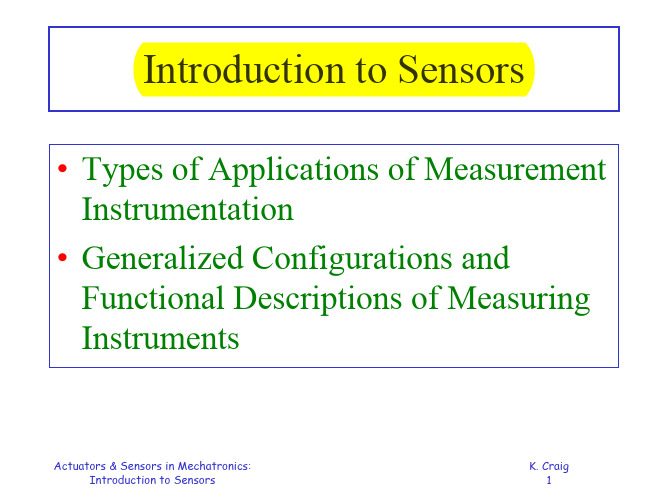
Actuators & Sensors in Mechatronics: Introduction to Sensors
K. Craig 1
Types of Applications of Measurement Instrumentation
• Monitoring of Processes and Operations • Control of Processes and Operations • Experimental Engineering Analysis
Actuators & Sensors in Mechatronics: Introduction to Sensors K. Craig 6
• Note
– The distinction among monitoring, control, and analysis functions is not clear-cut; the category decided on may depend somewhat on your point of view and the apparent looseness of the classification should not cause any difficulty. – It is now extremely common for engineers to include in the design of a machine or process, as dedicated components, computers of various sizes. Computers are important, but the computer “component” of many machines and processes is often not the critical system element in terms of either technical or economic factors. Rather, components external to the computer, the actuators and sensors, are more often the limiting factors in the system design.
传感器(sensor)英文PPT演讲课件
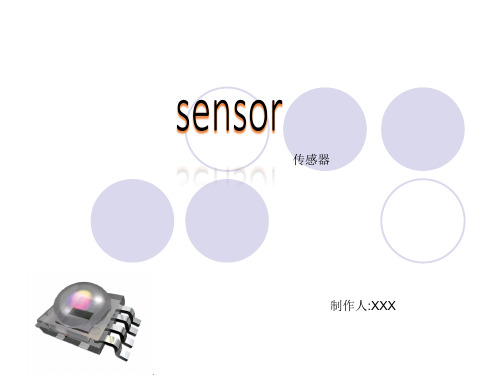
Acoustic sensors(声敏传感器)
Working principle
The sensor is sensitive to a built-in to sound capacitive [kə'pæsɪtɪv] electret microphone(电容式驻极话筒). Sound waves make the microphone electret film (驻极体膜) vibration [vaɪ'breɪʃ(ə)n], result in the change of capacitance [kə'pæsɪt(ə)ns], and produce with the corresponding change of tiny voltage ['vəʊltɪdʒ; 'vɒltɪdʒ]. Then this voltage is converted into 0 to 5 voltage, and transmitted to the computer, after A/D conversion was accepted by the data collector.
翻译
定义: 能感受规定的被测量并按照一定的 规律转换成可 用输出信号的器件或装置。 作用:
探测、感受外界的信号、物理条件(如光、 热、 湿度)或化学组成(如烟雾),并将 探知的信息传递给 其他装置或器官。
Light sensor
Light sensor is the most current production, one of the most widely used sensors, it plays an important role in automatic control(自动控 制) and non-electricity measurement [‘meʒəm(ə)nt] technology(非电量电测技 术). The simplest photosensitive sensor is photosensitive resistance(光敏电阻), it will create electric current when photons(光子) hit joint(结合处).
传感器中英文介绍
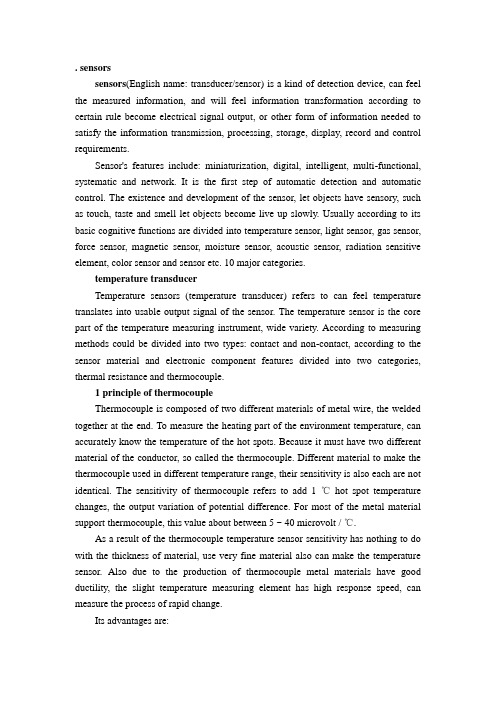
. sensorssensors(English name: transducer/sensor) is a kind of detection device, can feel the measured information, and will feel information transformation according to certain rule become electrical signal output, or other form of information needed to satisfy the information transmission, processing, storage, display, record and control requirements.Sensor's features include: miniaturization, digital, intelligent, multi-functional, systematic and network. It is the first step of automatic detection and automatic control. The existence and development of the sensor, let objects have sensory, such as touch, taste and smell let objects become live up slowly. Usually according to its basic cognitive functions are divided into temperature sensor, light sensor, gas sensor, force sensor, magnetic sensor, moisture sensor, acoustic sensor, radiation sensitive element, color sensor and sensor etc. 10 major categories.temperature transducerTemperature sensors (temperature transducer) refers to can feel temperature translates into usable output signal of the sensor. The temperature sensor is the core part of the temperature measuring instrument, wide variety. According to measuring methods could be divided into two types: contact and non-contact, according to the sensor material and electronic component features divided into two categories, thermal resistance and thermocouple.1 principle of thermocoupleThermocouple is composed of two different materials of metal wire, the welded together at the end. To measure the heating part of the environment temperature, can accurately know the temperature of the hot spots. Because it must have two different material of the conductor, so called the thermocouple. Different material to make the thermocouple used in different temperature range, their sensitivity is also each are not identical. The sensitivity of thermocouple refers to add 1 ℃hot spot temperature changes, the output variation of potential difference. For most of the metal material support thermocouple, this value about between 5 ~ 40 microvolt / ℃.As a result of the thermocouple temperature sensor sensitivity has nothing to do with the thickness of material, use very fine material also can make the temperature sensor. Also due to the production of thermocouple metal materials have good ductility, the slight temperature measuring element has high response speed, can measure the process of rapid change.Its advantages are:(1)high precision measurement. Because of thermocouple direct contact with the object being measured, not affected by intermediate medium.(2)the measurement range. Commonly used thermocouple from 1600 ℃to 50 ℃ ~ + sustainable measurement, some special thermocouple minimum measurable to - 269 ℃ (e.g., gold iron nickel chrome), the highest measurable to + 2800 ℃ (such as tungsten rhenium).(3) simple structure, easy to use. Thermocouple is usually composed of two different kinds of metal wire, but is not limited by the size and the beginning of, outside has protective casing, so very convenient to use. The thermocouple type and structure of the form.2. The thermocouple type and structure formation(1)the types of thermocoupleThe commonly used thermocouple could be divided into two types: standard thermocouple and non-standard thermocouple. Standard thermocouple refers to the national standard specifies its thermoelectric potential and the relationship between temperature, permissible error, and a unified standard score table of thermocouple, it has with matching display instrument to choose from. Rather than a standard thermocouple or on the order of magnitude less than the range to use standardized thermocouple, in general, there is no uniform standard, it is mainly used for measurement of some special occasions.Standardized thermocouple is our country from January 1, 1988, thermocouple and thermal resistance of all production according to IEC international standard, and specify the S, B, E, K, R, J, T seven standardization thermocouple type thermocouple for our country unified design.(2)to ensure that the thermocouple is reliable, steady work, the structure of thermocouple requirements are as follows:①of the two thermocouple thermal electrode welding must be strong;②two hot electrode should be well insulated between each other, in case of short circuit;③compensation wires connected to the free cod of a thermocouple to convenient and reliable;④protect casing thermal electrodes should be able to make sufficient isolation and harmful medium.3.The thermocouple cold end temperature compensationDue to the thermocouple materials are generally more expensive (especiallywhen using precious metals), and the temperature measurement points are generally more far, the distance to the instrument in order to save materials, reduce cost, usually adopt the compensating conductor) (the free end of the cold junction of the thermocouple to the steady control of indoor temperature, connected to the meter terminals. It must be pointed out that the role of the thermocouple compensation wire extension hot electrode, so that only moved to the control room of the cold junction of the thermocouple instrument on the terminal, it itself does not eliminate the cold end temperature change on the influence of temperature, cannot have the compensation effect. So, still need to take some of the other correction method to compensate of the cold end temperature especially when t0 indicates influence on measuring temperature 0 ℃.Must pay attention to when using thermocouple compensating conductor model match, cannot be wrong polarity, compensation conductor should be connected to the thermocouple temperature should not exceed 100 ℃.传感器传感器(英文名称:transducer/sensor)是一种检测装置,能感受到被测量的信息,并能将感受到的信息,按一定规律变换成为电信号或其他所需形式的信息输出,以满足信息的传输、处理、存储、显示、记录和控制等要求。
传感器英文课件第1章-basic knowledge
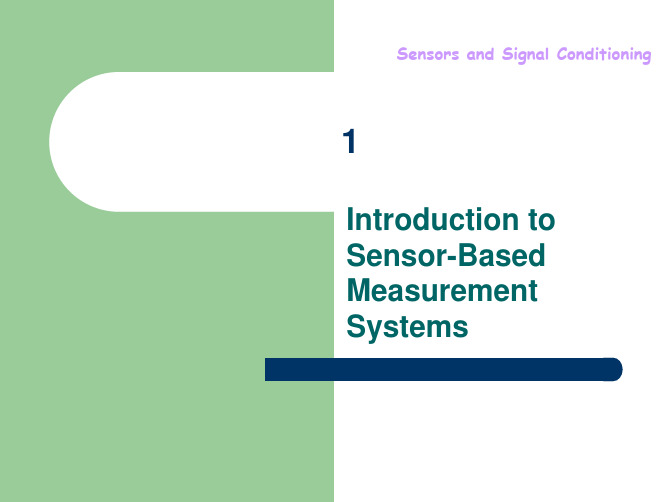
Transducers, Sensors, and Actuators
Transducer: converts a signal from one physical form to a corresponding signal having a different physical form “energy converter” (mechanical, thermal, magnetic, electric, chemical, and radiation) Sensor: offering an electric output A sensor may not be a transducer. modifier Input transducers (physical signal/electric signal) are termed sensors, or detectors for radiation, output transducers (electric signal/display or actuation) are termed actuators or effectors.
–
–
12
1.4 Static aracteristics of Measurement Systems
Accuracy, Precision, and Sensitivity
Accuracy is the quality that characterizes the capacity of a measuring instrument for giving results close to the true value of the measured quantity. Sensor accuracy is determined through static calibration. It consists of keeping constant all sensor inputs, except the one to be studied. Error: Any discrepancy between the true value for the measured quantity and the instrument reading. Absolute error: the difference between measurement result and the true value.
传感器介绍PPT课件
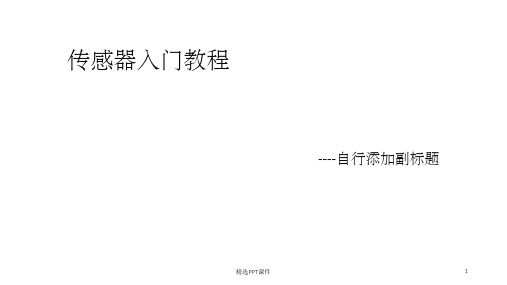
精选PPT课件
ቤተ መጻሕፍቲ ባይዱ
13
这里放Ardublock的程序图
精选PPT课件
14
LED模块
• LED又称发光二极管,由限流模块和发光部件组成 • 限流模块控制整个电路的电流不会太大,太大的电流会烧坏发光
二极管。 • 发光部件主要是发光二极管,可以将电能转化为光能。只要电路
中有电流流过,就会发光。电流大小还可以控制发光强弱的变化。
• 湿度传感器由敏感元件和转换电路组成。当环境湿度发生变化时, 湿度传感器的敏感元件产生相应的变化,传感器的转换电路把敏 感元件的变化量转换成电压量变化,对应于相对湿度0~100%RH 的变化,传感器的输出呈0~1v的线性变化。
• 下面我们通过Dht11,串口通信和IF开发板为大家做一个简单的演 示。
S = V·△t /2 这就是所谓的时间差测距法。由于超声波也是一种声波, 其声速C与温度有关,表1 列出了几种不同温度下的声速。在使用时,如果温度变化不大, 则可认为声速是基本不变 的。常温下超声波的传播速度是334 米/秒,但其传播速度V 易受空气中温度、湿度、压 强等因素的影响,其中受温度的影响较大,如温度每升高1 ℃, 声速增加约0. 6 米/ 秒。 如果测距精度要求很高, 则应通过温度补偿的方法加以校正。已知现场环境温度T 时, 超声波传播速度V 的计算公式为: V = 331.45 + 0.607T
• 下面我们就来用串口通信来探究一下吧。
精选PPT课件
17
这里放实际连接图
这里放Ardublock的程序图
没遇到黑线返回900以上的值 遇到黑线返回小于900的值
精选PPT课件
18
避障模块
• 避障传感器由一个红外线发射器和一个接收器组成。 • 通过发射端发射红外信号,接收端接收由障碍物反射回来的红外
- 1、下载文档前请自行甄别文档内容的完整性,平台不提供额外的编辑、内容补充、找答案等附加服务。
- 2、"仅部分预览"的文档,不可在线预览部分如存在完整性等问题,可反馈申请退款(可完整预览的文档不适用该条件!)。
- 3、如文档侵犯您的权益,请联系客服反馈,我们会尽快为您处理(人工客服工作时间:9:00-18:30)。
传感器
制作人:XXX
Living in a rapidly developing society,we have the chance to enjoy many things people who has died can not.
But every machine can not work
分类
按用途分类 压力敏和力敏传感器、位置传感器、液位传感器、能耗传感器、速度传感器、加速度传感器、射线辐射 传感器、热敏传感器。 按原理分类 振动传感器、湿敏传感器、磁敏传感器、气敏传感器、真空度传感器、生物传感器等。 按输出信号为标准分类 模拟传感器:将被测量 传感器的非电学量转换成模拟电信号。 数字传感器:将被测量的非电学量转换成数字输出信号(包括直接和间接转换)。 膺数字传感器:将被测量的信号量转换成频率信号或短周期信号的输出(包括直接或间接转换)。 开关传感器:当一个被测量的信号达到某个特定的阈值时,传感器相应地输出一个设定的低电平或高电 平信号。 按其制造工艺分类 集成传感器是用标准的生产硅基半导体集成电路的工艺技术制造的。 通常还将用于初步处理被测信号的部分电路也集成在同一芯片上。 薄膜传感器则是通过沉积在介质衬底(基板)上的,相应敏感材料的薄膜形成的。使用混合工艺时,同 样可将部分电路制造在此基板上。 厚膜传感器是利用相应材料的浆料,涂覆在陶瓷基片上制成的,基片通常是Al2O3制成的,然后进行热 处理,使厚膜成形。 陶瓷传感器采用标准的陶瓷工艺或其某种变种工艺(溶胶、凝胶等)生产。 完成适当的预备性操作之后,已成形的元件在高温中进行烧结。厚膜和陶瓷传感器这二种工艺之间有许 多共同特性,在某些方面,可以认为厚膜工艺是陶瓷工艺的一种变型。 每种工艺技术都有自己的优点和不足。由于研究、开发和生产所需的资本投入较低,以及传感器参数的 高稳定性等原因,采用陶瓷和厚膜传感器比较合理。
按测量目分类 物理型传感器是利用被测量物质的某些物理性质发生明显变化的特性制成的。 化学型传感器是利用能把化学物质的成分、浓度等化学量转化成电学量的敏感元件制 成的。 生物型传感器是利用各种生物或生物物质的特性做成的,用以检测与识别生物体内化 学成分的传感器。 按其构成分类 基本型传感器:是一种最基本的单个变换装置。 组合型传感器:是由不同单个变换装置组合而构成的传感器。 应用型传感器:是基本型传感器或组合型传感器与其他机构组合而构成的传感器。 按作用形式分类 按作用形式可分为主动型和被动型传感器。 主动型传感器又有作用型和反作用型,此种传感器对被测对象能发出一定探测信号, 能检测探测信号在被测对象中所产生的变化,或者由探测信号在被测对象中产生某种 效应而形成信号。检测探测信号变化方式的称为作用型,检测产生响应而形成信号方 式的称为反作用型。雷达与无线电频率范围探测器是作用型实例,而光声效应分析装 置与激光分析器是反作用型实例。 被动型传感器只是接收被测对象本身产生的信号,如红外辐射温度计、红外摄像装置 等。
Aplication
A. the sensor does not need to check it again, the software zero(调零)automatically. B. sampling frequency must reach10000 times per second or more, otherwise,it’s not true and accurate to reflect the image of acoustic vibration. C. y coordinate of the image represents the voltage value corresponding to acoustic vibration . D. when cost limited , manufacturers can use positive and negative signal output, such as: TZ – 2KA and so on.
Others
新浪视频- 英国:传感器吃进肚 监测用药时 间 美国研发园艺传感器 植物“悲喜”尽在掌 握
翻译
定义: 能感受规定的被测量并按照一定的 规律转换成可 用输出信号的器件或装置。 作用:
探测、感受外界的信号、物理条件(如光、 热、 湿度)或化学组成(如烟雾),并将 探知的信息传递给 其他装置或器官。
Light sensor
Light sensor is the most current production, one of the most widely used sensors, it plays an important role in automatic control(自动控 制) and non-electricity measurement [‘meʒəm(ə)nt] technology(非电量电测技 术). The simplest photosensitive sensor is photosensitive resistance(光敏电阻), it will create electric current when photons(光子) hit joint(结合处).
Acoustic sensors(声敏传感器)
Working principle
The sensor is sensitive to a built-in to sound capacitive [kə'pæsɪtɪv] electret microphone(电容式驻极话筒). Sound waves make the microphone electret film (驻极体膜) vibration [vaɪ'breɪʃ(ə)n], result in the change of capacitance [kə'pæsɪt(ə)ns], and produce with the corresponding change of tiny voltage ['vəʊltɪdʒ; 'vɒltɪdʒ]. Then this voltage is converted into 0 to 5 voltage, and transmitted to the computer, after A/D conversion was accepted by the data collector.
pressure sensor
Pressure sensors can be classified in terms of pressure ranges they measure, temperature ranges of operation, and most importantly the type of pressure they measure.
Working principle
Light sensors can converts light signals into electrical signals with photosensitive element sensor , its sensitive wavelengths is close to the visible light wavelength, including infrared wavelengthand ultraviolet wavelengths. Light sensor is not limited to light detection, it also can be used as a detection device of other sensors to test many non-electrical, as long as the nonelectric can be converted into optical signal changes.
Hall effect sensor
Hall effect sensor
● Measure the arbitrary waveform cu rrent, such as DC, AC, and even to tra nsient peak parameters measurement; ● High precision. General Hall current sensor module’s precision in the work area is higher than 1%, and the precis ion is suitable for any waveform meas urement; ● The linearity is better than 0.5%; ● High reliability. Small size, light wei ght, easy to install and it will not bring any loss to the system. In view of the a bove high performance characteristics, the Hall current sensors gain the wide applications.
